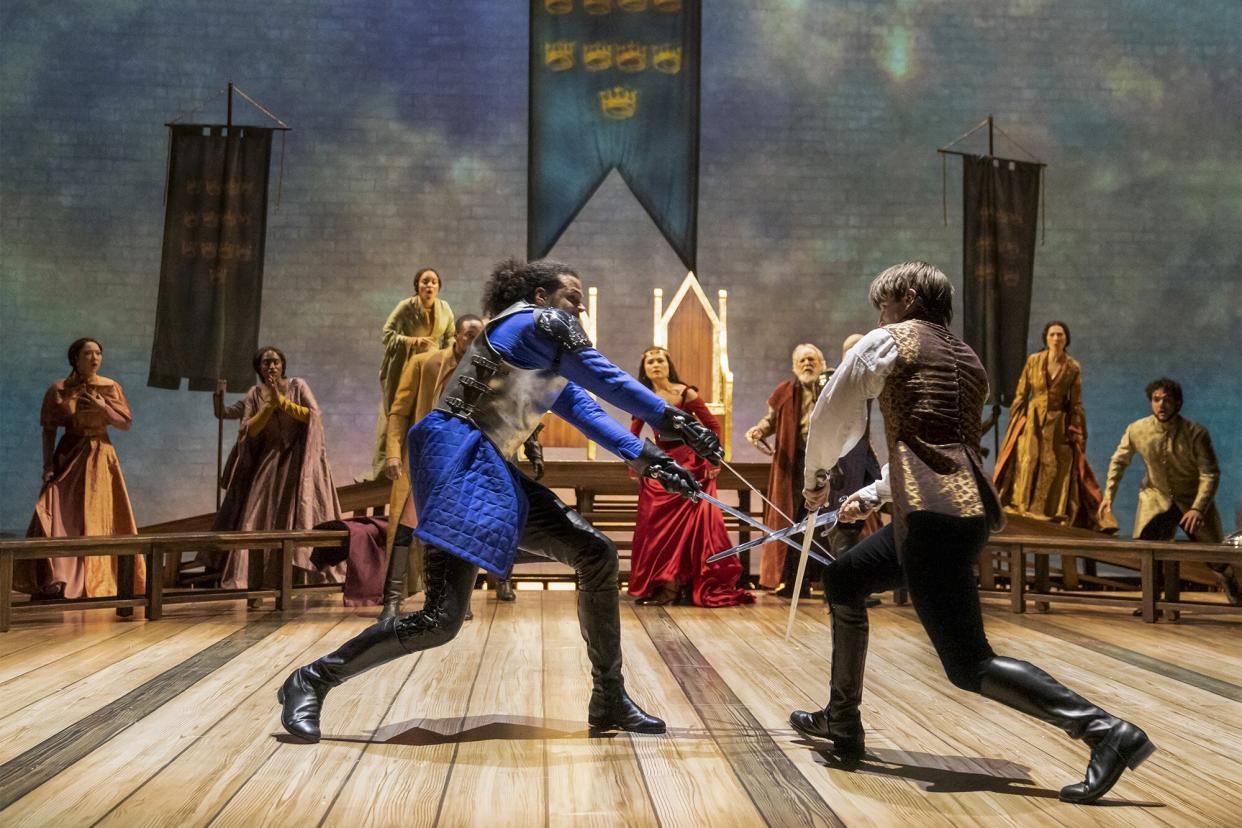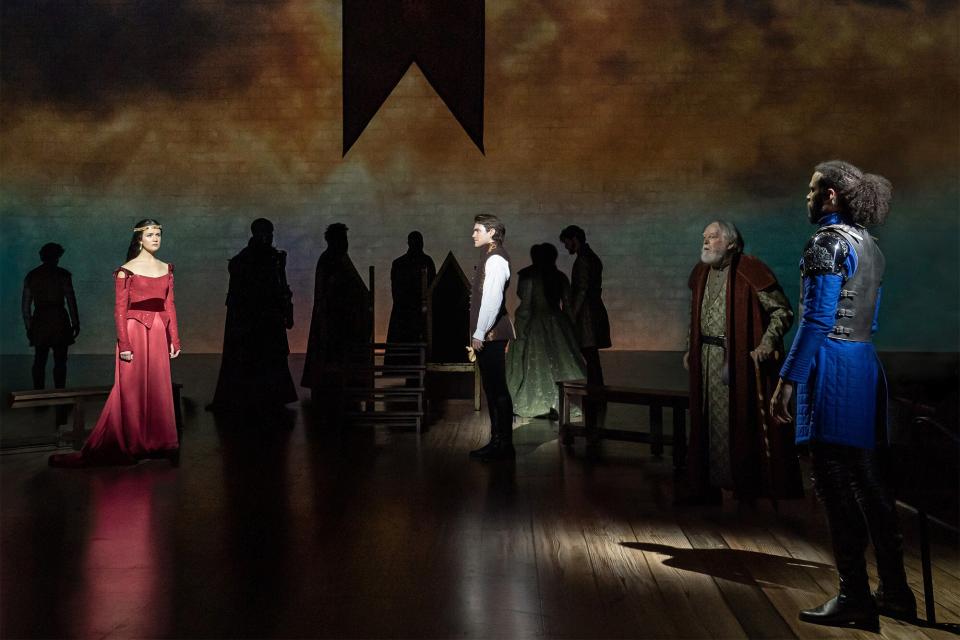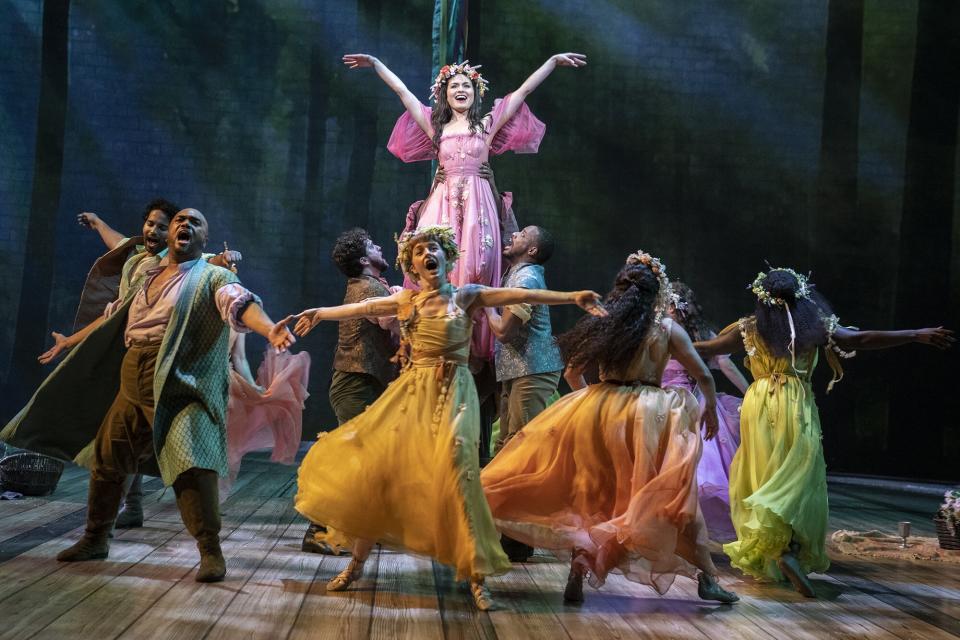Camelot review: Aaron Sorkin's updated Broadway revival is a royal delight

- Oops!Something went wrong.Please try again later.
- Oops!Something went wrong.Please try again later.
- Oops!Something went wrong.Please try again later.
Proposition: What makes a king great? Is it someone who is willing to fight to the death to protect their people, like Aragorn in Lord of the Rings? Perhaps someone who's "free to roam around all day" and "do it all my way," like young Simba dreams of in The Lion King? Or, as Aaron Sorkin posits in his shining Broadway revival of Lerner & Loewe's Camelot, is it nothing to do with divine providence and everything to do with having the courage to sow the seeds of a brighter tomorrow, even if you may not live to see them bloom?
Following their heralded 2018 Broadway adaptation of To Kill A Mockingbird, Sorkin has teamed up once again with director Bartlett Sher on a crusade to bring Camelot to the Lincoln Center's Vivian Beaumont Theater for one fleeting wisp of glory. But, where Sorkin did not stray far from Harper Lee's source material, he holds no such allegiance to T. H. White's The Once and Future King, which served as the backbone for Alan Jay Lerner's original book, and has entirely rewritten the Arthurian legend into a moving tale of love, loyalty, and leadership.
While it still utilizes most of the same overall plot points, including Lerner's lyrics and Frederick Loewe's plush musical accompaniment, Sorkin's updated book reinvents the 1960 musical with a few key differences straight out of the gate. Not only is its timeline condensed into less than two years, but its three protagonists — King Arthur (Tony award-winner Andrew Burnap), the princess of France Guenevere (Phillipa Soo), and Lancelot du Lac (Jordan Donica) — are all younger and thus more blissfully naive when it comes to their quixotic dream of forming a government that serves its people. There are also no magical forces at play in this Camelot, unless you count the mystifying nature of science and technology, and long gone are the days of Merlyn (Dakin Matthews) being swept away by a water nymph. At one point, Arthur even gleefully guffaws at the notion that his people genuinely believe that he has slayed dragons.

Joan Marcus Lancelot (Jordan Donica) and Arthur (Andrew Burnap) duel in 'Camelot'
Instead, Sorkin's retelling provides a more grounded approach to the rise and fall of the beautiful dream of democracy, presenting each of its three stars with their own vulnerabilities, aspirations, and oversights. Arthur, a commoner turned King of England after he unknowingly extracts Excalibur from stone, is still a child at heart and positively petrified to marry Princess Guenevere as part of his kingdom's negotiations with France. The pair meet in the forest — brought to life in vivid, Disney-esque detail via sprawling projections by production company 59 Projections — as she's attempting to flee the country after her recent "carriage ride to hell." Bolstered by Sorkin's quick wit, free-flowing humor, and starry-eyed ideals, their barbed back-and-forth slowly melts into a coquettish conversation that ends with Guenevere agreeing to marry him.
Far from a passive princess, Genuevere is instrumental in helping Arthur create the Knights of the Round Table and championing the idea of a kingdom where everyone is equal. With her strong moral backbone, Guenevere plots each move carefully and often delights in running circles around Arthur and his knights as she waits for them to connect the dots (at one point, she absolutely demolishes her husband in a game of chess). Her pride, however, prevents her from seeing the tragedy that looms ahead in the distance — as Lancelot du Lac arrives to earn his place as one of Arthur's knights — until it is far too late.
Lancelot, an outwardly vain, yet solemn Frenchman whose fealty to Arthur is rivaled only by his loyalty to God, quickly wins over the king's favor with his swordsmanship and rises within the ranks to become one of his closest friends. His relationship with Guenevere, who unapologetically dubs him a "jackass," is slower to the draw, but burns twice as bright when they fall in love, setting up a love triangle that threatens to demolish the beautiful future they all intend to build. Cue the longing stares, the clenched fists à la 2005's Pride and Prejudice, a ton of unresolved tension, and, ultimately, the forgiveness of one brokenhearted king.

Joan Marcus Guenevere (Phillipa Soo), Arthur (Andrew Burnap), and Lancelot (Jordan Donica) face a difficult crossroads in 'Camelot'
However, much like its heroes, Sorkin's Camelot sacrifices its heart in favor of spearheading its valiant principles and similarly suffers the same consequences. The love triangle between Guenevere, Lancelot, and Arthur — which later develops into a quasi-love rectangle with the addition of Morgan Le Fey (Marilee Talkington, making her Broadway debut) — lacks connection between Arthur and Guenevere until far too late into the musical's almost three hour runtime. While they share an undeniable spark, their relationship slowly becomes more platonic as it is sidelined by their royal responsibilities and Lancelot and Guenevere's forbidden romance; in fact, Guenevere doesn't even learn of Arthur's affections until deep into the second act. A late attempt to rush their romance — and retroactively assert that they're both in love with one another — falls flat given viewers have watched Guenevere yearn for Lancelot across multiple love songs beforehand.
That's not to say, however, that Burnap, Soo, and Donica aren't bringing absolutely everything they have to the (round) table with their stellar performances. Despite all of the hardships that Arthur faces throughout the musical, Burnap still manages to make him an affable, awkward, and jovial king until the very end — one that you can't help but root for and, when he inevitably stumbles, you hope stands back up even taller. He wonderfully breathes life, sensitivity, and endless optimism into Sorkin's speeches, transforming them into fierce rally cries that could inspire anyone, and his performance of "Camelot" is a sweet standout.
Soo is brilliant as Guenevere, imbuing the character not only with razor-sharp wit and deadpan comedic delivery, but also a great sense of sadness too. Her rendition of "The Lusty Month of May" is nothing short of an absolute triumph that not only flaunts her breathtaking vocals, but also Guenevere's cheeky side too. Meanwhile, Donica's Lancelot is a marvelous mix of both lovesick and courageous — flittering between boldly going toe-to-toe against Arthur in battle to suddenly shrinking his towering six-foot-tall frame the minute Guenevere walks in the door. His poignant performance of "If Ever I Would Leave You" is truly unforgettable.

Joan Marcus Guenevere (Phillipa Soo) revels in the lusty month of May in 'Camelot'
The trio are joined onstage by the rest of Camelot's phenomenal ensemble, which includes the skillful Matthews, who plays both Merlyn and the delightfully senile Pellinore, as well as Talkington's cunning portrayal of Morgan Le Fey and Taylor Trensch's devious turn as Arthur's illegitimate son, the dramatic trickster Mordred.
While the literal magic of Camelot might be absent this time around, there's still an endless amount of theater magic at play throughout the entire performance. Michael Yeargan's stunning set design seamlessly transforms the theater's massive stage into the crest of a snow-covered hill, a blooming May Day celebration, and a war-ravaged battlefield, while Jennifer Moeller's dazzling regal robes and polished armor sparkles under Lap Chi Chu's perfectly placed spotlights. And, if that wasn't enough, fight director B. H. Barry's battles bring both a sense of the era and excitement to the musical too.
More than 60 years after its original Broadway debut, Camelot's overarching message of trying to make the world a better place — even if one should fail along the way — still feels as fresh and resonant as ever. Reinvigorated by Sorkin — who has long painted a dreamy, egalitarian view of politics within his works — and his new book, the musical succeeds in evoking that dream for one brief, shining moment once again. B+
Sign up for Entertainment Weekly's free daily newsletter to get breaking TV news, exclusive first looks, recaps, reviews, interviews with your favorite stars, and more
Related content:

